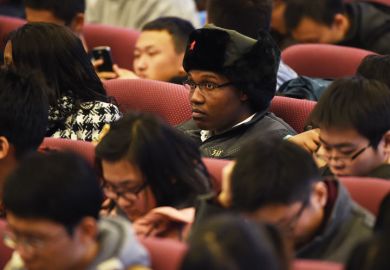African students in China report being kept separate from their Chinese counterparts and struggling to integrate, research has found.
There were 81,000 African students enrolled in Chinese universities in 2018 and, although more recent figures are unavailable, many continue to be attracted by low tuition fees, favourable entry requirements and scholarship offers, said Benjamin Mulvey, a lecturer at the University of Glasgow.
In turn, the superpower is keen to enrol Africans in Chinese universities as part of its foreign policy goals to expand soft power and economic ties on the continent.
However, Dr Mulvey’s research has found that some of these recruits end up in a “two-track” education system, where they are either physically separated from or treated differently to Chinese students.
For his book, Mapping International Student Mobility between Africa and China, Dr Mulvey interviewed 45 African students from across the continent and found most had faced “somewhat negative” academic experiences when studying in China.
Some reported being treated more leniently than their Chinese counterparts or receiving a substandard education, which they perceived as a lack of care from their teachers who knew they would be leaving the country upon graduation.
One student said: “One of my professors last semester, he actually told us, they don’t educate us to work here. If that was the case, we would get a quality education.”
Most international students were given separate accommodation to local students, and, for those studying in Chinese, many were placed in different classes to Chinese students. (English-medium courses at Chinese universities are usually only open to international students.)
Dr Mulvey says this “two-track” education system reduces “students’ opportunities to accumulate some of the most potent forms of capital associated with overseas study”, including academic competencies, language skills and “transnational social connections”.
“Most students perceived that the content of the programmes themselves would be of limited use, given the ‘leniency’ of their lecturers and the resultant perception that these study programmes lacked academic rigour,” he writes.
The book also notes: “While university administrators and other stakeholders suggest that international students are given more comfortable accommodation, students understood that they were concerned about the possible implications of locals mixing with international students in the living quarters.”
One student felt that locals held negative views towards black people and those from Africa in particular. Dr Mulvey writes that this perception was in line with other reports and reflects “heightened negative sentiment towards Africans in China in recent years”. Most notably, Africans faced widespread discrimination at the beginning of the Covid-19 pandemic.
As China continues to recruit African students, Dr Mulvey believes that any sort of change to these attitudes “seems unlikely” in the short term.
“There is no official acknowledgement of this problem, and there is a widespread perception in China that racism is a ‘Western problem’ that doesn’t exist in China,” he told Times Higher Education. “In fact, if anything, xenophobia seems to be getting worse, as there has been a shift towards Han supremacism and ethnic nationalism in the past few years.”
Despite these concerns, he believes that African students will not be deterred from studying in China: “As long as China still provides a large number of scholarships, and still has favourable entry requirements, along with lower tuition fees, students will continue to come.
“Also, students may experience racism in other destinations, so if they did have another choice, this might not have put them off China specifically.”
Register to continue
Why register?
- Registration is free and only takes a moment
- Once registered, you can read 3 articles a month
- Sign up for our newsletter
Subscribe
Or subscribe for unlimited access to:
- Unlimited access to news, views, insights & reviews
- Digital editions
- Digital access to THE’s university and college rankings analysis
Already registered or a current subscriber?








